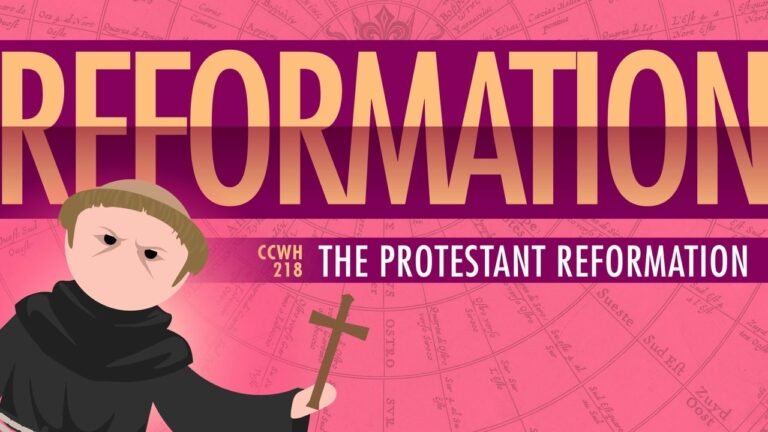Understanding the Protestant Reformation: A Comprehensive Definition
The Protestant Reformation, a monumental movement that began in the 16th century, fundamentally transformed the landscape of Christianity and European society. This religious upheaval challenged the authority of the Catholic Church, leading to the emergence of various Protestant denominations and a shift towards individual interpretation of scripture. By examining the definition of the Protestant Reformation, we can better understand its profound impact on religious practices, political structures, and cultural norms that continue to resonate today.
What is a brief definition of the Protestant Reformation?
The Protestant Reformation was a significant religious movement that emerged in Europe during the 16th century, fundamentally altering the landscape of Christianity. It was characterized by a widespread challenge to the teachings and authority of the Roman Catholic Church, leading to the establishment of various new denominations that collectively identified as Protestantism.
This movement not only reshaped religious beliefs and practices but also had profound social and political implications. By advocating for individual interpretation of the Scriptures and emphasizing personal faith, the Reformation encouraged a spirit of inquiry and reform that resonated across Europe, leaving a lasting legacy on both religion and society.
What was the central concept of the Protestant Reformation?
The Protestant Reformation marked a monumental shift in the landscape of Christianity, challenging the established authority of the Catholic Church. Reformers like Martin Luther and John Calvin questioned the pope’s supremacy and sought to address what they viewed as corrupt practices within the Church. This movement ultimately aimed to return Christianity to its biblical foundations, emphasizing a more personal and direct relationship with God.
Central to the Reformation was the belief in the Bible as the sole authority for faith and conduct. Reformers argued that individuals should rely on Scripture rather than Church traditions or interpretations. This principle encouraged a more personal exploration of faith, empowering laypeople to engage with biblical texts and fostering a diverse range of interpretations and practices across various Protestant denominations.
The Reformation also emphasized the concept of salvation through God’s grace and faith in Jesus Christ, rather than through works or the intercession of priests. This shift not only transformed religious beliefs but also had profound social and political implications, influencing the development of modern Western thought and the rise of individualism. The legacy of the Reformation continues to shape contemporary Christianity and its diverse expressions around the world.
What is the most accurate definition of Reformation?
Reformation embodies the act of transforming institutions—be they religious, political, or societal—into more just and beneficial entities. This process often arises from a desire for improvement and change, reflecting the collective aspirations of individuals who seek to challenge the status quo. By fostering dialogue and encouraging new perspectives, reformation serves as a catalyst for progress and renewal.
One of the most significant instances of reformation in history is the Protestant Reformation, which began in 1517. This movement was spearheaded by figures such as Martin Luther and sought to address perceived corruption within the Catholic Church. The resulting upheaval not only transformed religious practices but also had profound impacts on societal structures, paving the way for new denominations and altering the course of European history.
The legacy of the Reformation extends beyond its religious roots, influencing political thought and social dynamics for generations. It emphasized the importance of individual faith and interpretation of scripture, leading to a greater emphasis on personal agency and critical thinking. This transformation continues to resonate today, as reformation remains a powerful concept that inspires ongoing change in various facets of society.
Unraveling the Roots of Reform
Throughout history, reform has often emerged as a response to societal challenges, reflecting a collective desire for progress and improvement. These movements, whether political, social, or economic, are deeply rooted in the historical context of the time. Understanding the origins of these reforms provides insight into the motivations and aspirations of those who initiated them, revealing a pattern of human resilience and creativity in the face of adversity.
At the heart of many reform movements lies a profound sense of injustice or inequality that compels individuals and groups to take action. From the abolition of slavery to women’s suffrage, these pivotal moments were driven by passionate advocates who sought to dismantle oppressive systems and create a more equitable society. Their efforts often required the courage to challenge established norms and the vision to imagine a better future, highlighting the transformative power of grassroots activism.
Today, the legacy of past reforms continues to inspire contemporary movements seeking change. By studying the roots of these historical efforts, we can better appreciate the complexities of modern challenges. The lessons learned from previous struggles serve as a guiding light, reminding us that reform is not merely a reaction but an ongoing journey fueled by hope, determination, and the unwavering belief in the possibility of a brighter tomorrow.
Key Ideas That Shaped Modern Christianity
Modern Christianity has been profoundly shaped by a series of key ideas that have evolved over centuries, influencing both doctrine and practice. The emphasis on personal faith and the individual’s relationship with God emerged during the Reformation, challenging the hierarchical structure of the Church and fostering a sense of spiritual autonomy. Additionally, the rise of the Enlightenment brought forth critical thinking and an emphasis on reason, prompting believers to reconcile faith with scientific understanding. Social movements, such as abolitionism and civil rights, further transformed Christian thought, highlighting the faith’s role in advocating for justice and equality. Together, these ideas have woven a rich tapestry that continues to define and inspire contemporary Christian beliefs and communities around the world.
The Impact of Change: Religion and Society
Change is an inevitable force that shapes both religion and society, often acting as a catalyst for transformation. As cultural landscapes evolve, religious beliefs and practices must adapt to remain relevant. This dynamic interplay can lead to the emergence of new interpretations and movements within established faiths, fostering a dialogue that bridges traditional values with contemporary issues. Such adaptations can revitalize communities, drawing in younger generations who seek spiritual meaning in an ever-changing world.
At the same time, societal shifts challenge religious institutions to address pressing moral and ethical dilemmas, pushing them to take stances on issues like social justice, environmental stewardship, and human rights. This engagement not only strengthens the role of religion in public life but also encourages a greater sense of responsibility among followers. As both religion and society navigate the waters of change together, they create a rich tapestry where faith can inspire action, and societal progress can foster deeper spiritual understanding.
A Journey Through Faith and Transformation
In the heart of every individual lies a unique story of faith, often marked by moments of doubt and awakening. This journey begins with a single step—a whisper of hope that beckons us to seek deeper truths. As we navigate through life’s challenges, we encounter transformative experiences that reshape our beliefs and inspire resilience. Each trial becomes a stepping stone, leading us toward a more profound understanding of ourselves and our place in the world.
As we embrace this journey, we discover the power of connection, both with ourselves and with others. Sharing our stories fosters a sense of community, reminding us that we are not alone in our struggles. Through compassion and understanding, we cultivate a fertile ground for growth, allowing our faith to flourish. Ultimately, this path of transformation illuminates a brighter future, where love and purpose guide our every step, urging us forward into the unknown with courage and grace.
The Protestant Reformation marked a pivotal moment in history, reshaping religious, political, and cultural landscapes across Europe. By challenging the established doctrines of the Catholic Church, reformers ignited a movement that championed individual interpretation of scripture and paved the way for diverse Christian denominations. This transformative period not only influenced the course of Christianity but also laid the groundwork for modern concepts of freedom, governance, and personal belief, echoing its significance in today’s society. Understanding the definition for the Protestant Reformation is essential to grasp the profound changes it brought about and its enduring legacy in the contemporary world.







